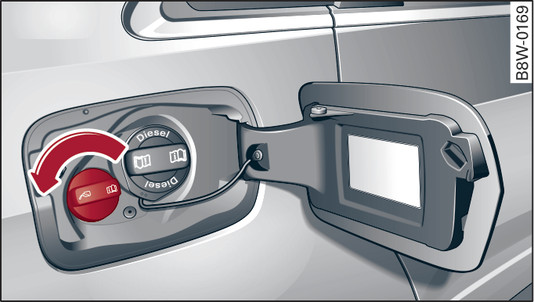|
Applies to: vehicles with selective catalytic reduction
The AdBlue filler neck is located immediately beside the diesel filler neck.
The AdBlue tank has a capacity of approx. 12 litres/24 litres*.
When the instrument cluster displays the request to fill up AdBlue, fill up at least the amount of AdBlue displayed. If you do not refill this amount of fluid, the system may not detect that the tank has been refilled and it may not be possible to restart the engine.
Park the vehicle on a level surface.
Switch off the ignition.
Open the tank flap link►.
Unscrew the cap on the filler neck anti-clockwise
Fig. 273►.
AdBlue can cause irritation to the skin, eyes, and respiratory organs. Wash thoroughly with clean water should you come into contact with this fluid. Seek medical assistance if needed.
- Improper handling of AdBlue can cause damage to the vehicle not covered by the warranty.
- Use only AdBlue that complies with the ISO 22241-1 standard. Do not mix AdBlue with additives and do not dilute it with water.
- AdBlue must not be added to the diesel tank, and diesel must not be added to the AdBlue tank. Never start the engine if you fill up with the wrong type of fuel, as this could damage the tank system and the engine. Obtain professional assistance.
- AdBlue attacks surfaces such as paintwork, plastic veneer and carpets. Remove spilt fluid as soon as possible with a damp cloth and plenty of water. If the AdBlue has already solidified, use warm water and a sponge. Residues of AdBlue solidify after a while if they are not removed and can damage the affected surface.
- Do not keep refill bottles or canisters in the vehicle, as AdBlue can leak and damage the vehicle interior.
- Keep AdBlue away from clothing. Wash thoroughly with clean water should you come into contact with this fluid.
Note
Please follow the AdBlue manufacturer s instructions for storage and use.

